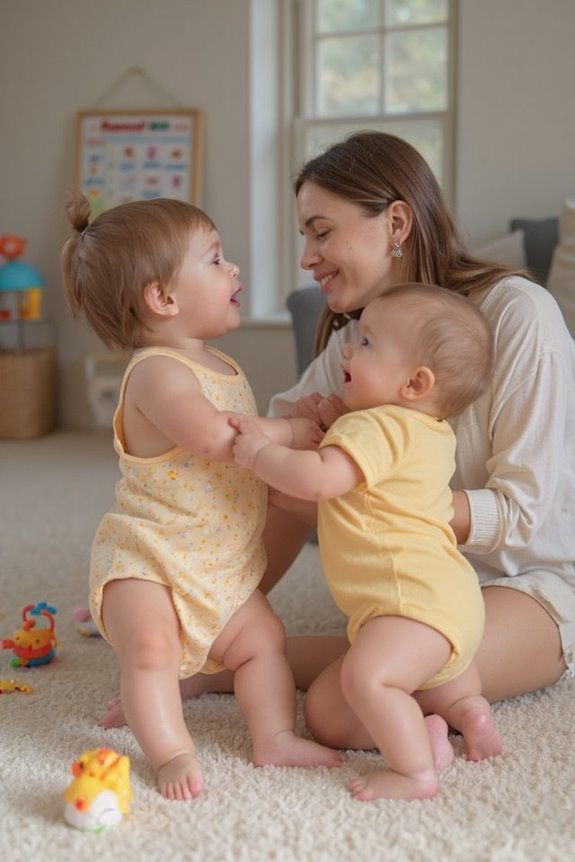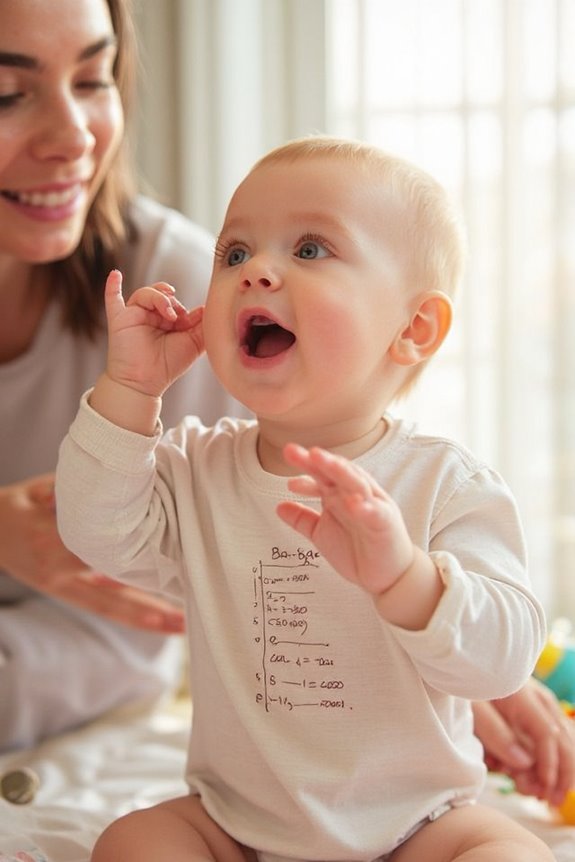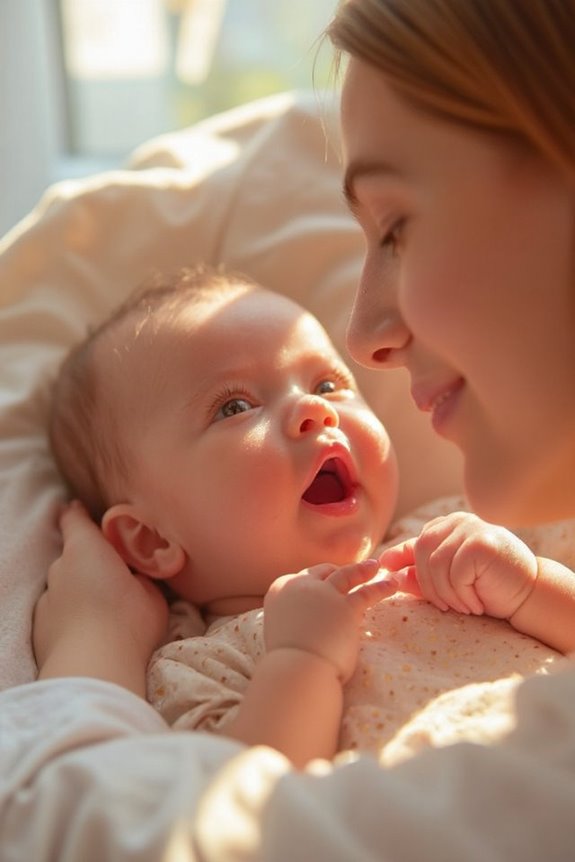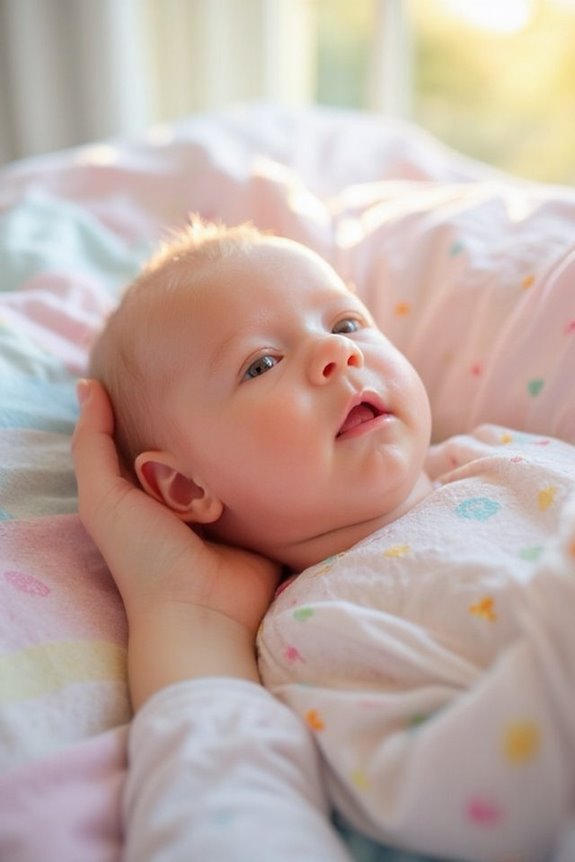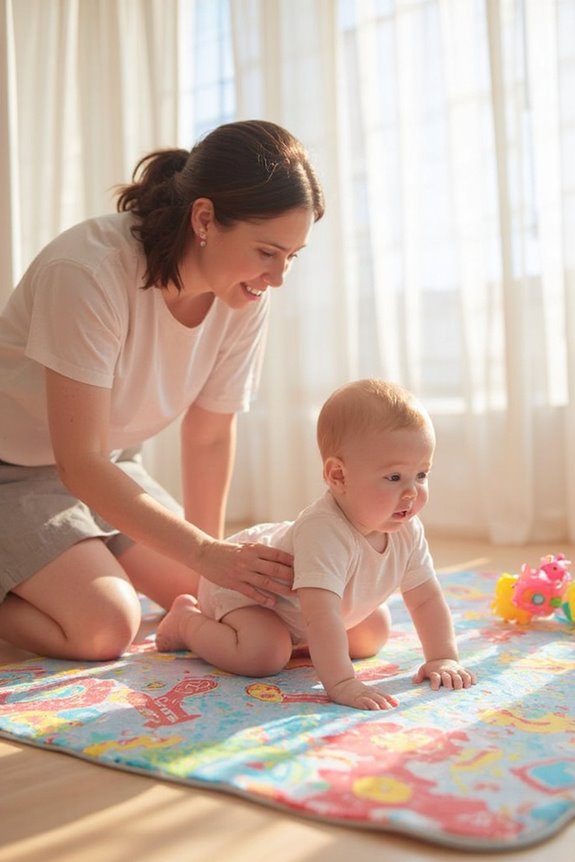Babies typically say “mama” with meaning between 9-12 months, though they may babble “ma-ma” sounds without understanding around 6 months. While many babies say “dada” first because the “d” sound is easier to produce, every child develops at their own pace. Factors affecting this milestone include language exposure, motor development, and hearing ability. Talking to your baby frequently and responding to their attempts at communication can encourage this exciting language development. The full journey to first words reveals fascinating developmental patterns.
Key Takeaways
- Babies typically say “mama” with meaning between 7-12 months, though babbling may include these sounds earlier.
- Babbling with “mama” sounds begins around 6 months but lacks intentional communication.
- Most babies master saying “mama” as a meaningful word by 12 months when first words typically emerge.
- The “ma” sound requires more complex motor movements than “da,” which is why “dada” often comes first.
- Language exposure, motor development, hearing ability, and emotional attachment all influence when a baby says “mama.”
The Developmental Path to First Words
While every baby is unique in their developmental journey, most follow a predictable path toward saying their first words. Understanding these vocalization milestones can help you track your child’s progress.
Babies begin communicating from birth through:
- Pre-linguistic sounds (birth-5 months)
- Cooing and crying as early communication cues
- Gestures like pointing before speech develops
- Babbling around 6 months (“ba-ba,” “da-da”)
Your baby’s receptive language skills develop before speaking abilities. They’ll understand words and simple commands around 12 months, which typically precedes their first actual word. Most babies say their first recognizable word around 12 months, though this ranges from 9-18 months for typically developing children.
Remember that high-pitched voices and facial expressions greatly support language development during these vital early stages.
Understanding Babbling vs. Meaningful Speech
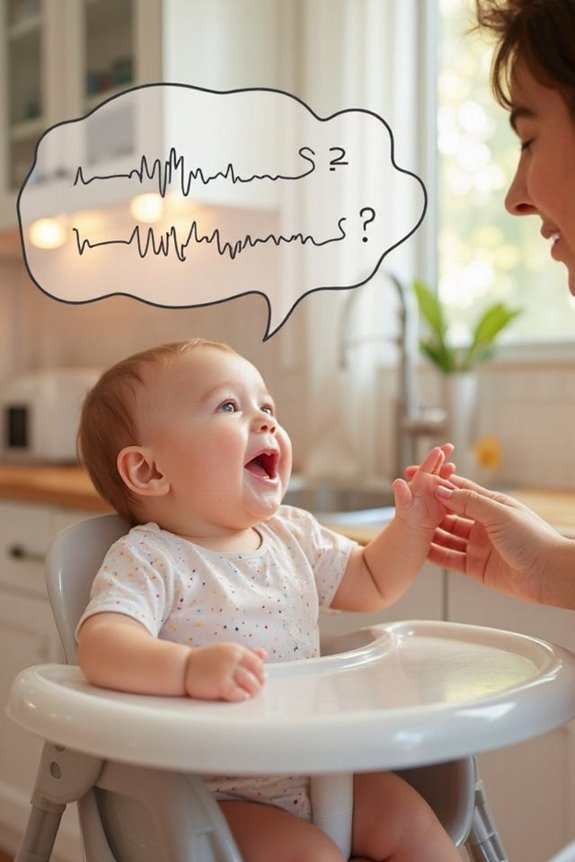
Your baby’s babbles represent a major milestone in their journey toward language mastery. While those adorable “ma-ma” sounds may start around 6-7 months, they likely don’t carry actual meaning yet.
The key differences between babbling and meaningful speech include:
- Speech intent: Babbling is exploratory and practice-oriented, while meaningful speech intentionally communicates specific needs or thoughts
- Audience awareness: Babbling characteristics evolve from random vocalizations to social engagement
- Contextual use: True meaningful “mama” emerges around 9-12 months when your baby connects the sound to you
When your baby uses “mama” consistently in your presence and shows recognition that the word refers to you specifically, they’ve moved from babbling to meaningful speech—an exciting communication breakthrough!
Why “Dada” Often Comes Before “Mama”
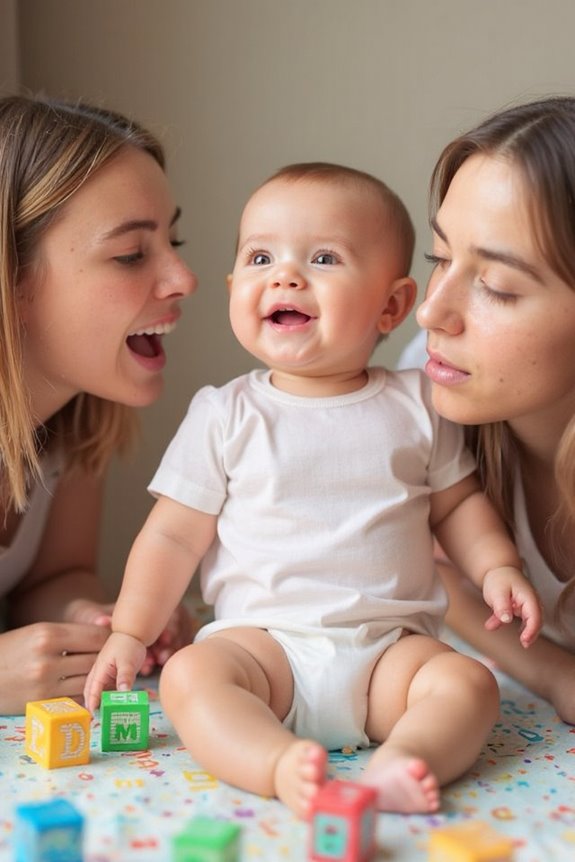
Despite many parents’ hopes that “mama” will be their baby’s first word, “dada” frequently claims the spotlight as baby’s initial meaningful utterance. This phenomenon largely stems from phonetic simplicity—the “da” sound requires less complex motor movements in a baby’s developing mouth than “ma” does.
Speech therapists confirm that:
– The “da” sound is naturally easier to produce
- Babies develop sounds from front to back of the mouth
- “Da” involves simpler tongue positioning than “ma”
- 3 months: Babies start listening to voices and cooing
- 6 months: Babbling begins, including “mama” sounds without meaning
- 7-9 months: Some early talkers may say “mama” with meaning
- 12 months: Average age for first words, often including “mama”
- 18 months: Late bloomers typically master “mama” by this point
- Language exposure – Babies who hear more words and conversation develop speech earlier
- Motor development – The “m” sound requires specific lip control some babies master later
- Hearing ability – Any auditory processing difficulties can delay speech development
- Emotional attachment – Strong bonds with caregivers motivate communication attempts
- Individual differences – Each baby’s unique cognitive focus and development pace affect timing
- Provide consistent vocal stimulation by repeating “mama” during daily routines like diaper changes and feeding
- Engage in interactive games that pair the word “mama” with positive experiences
- Use emotional expression when saying “mama” to help your baby connect the word with you
- Incorporate sensory play that includes the sound “ma-ma” with tactile experiences
- Words emphasized in daily interactions become prioritized in a baby’s vocabulary
- Demonstratives (“this” and “that”) are common first words across diverse languages
- Cultural practices affect which words babies hear most frequently
- The timing of first words (typically 9-12 months) remains relatively consistent across cultures
- No response to sounds by 6 months
- No babbling by 9 months
- No first words by 12-18 months
- No two-word combinations by 24 months
- No phrases by age 2
This doesn’t reflect bonding significance or preference for one parent over another. Rather, it’s purely developmental. The recognition of “dada” often marks an important milestone: baby’s ability to identify caregivers as separate individuals. This distinction represents cognitive growth, not emotional preference.
Typical Timeline for Saying “Mama”
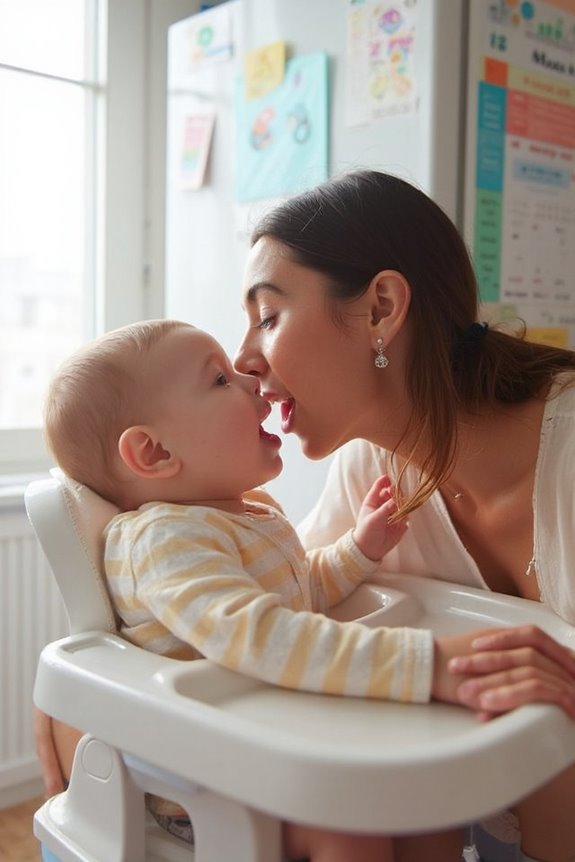
Most babies begin saying “mama” between 9 and 14 months of age, though there’s significant variation in this developmental milestone. The journey toward this speech readiness follows a predictable pattern:
I’ve found that mama milestones don’t always follow textbook timelines. While some children speak early, others take their time developing the necessary vocal skills. Remember that each baby develops at their own pace, with various factors influencing when they’ll first call you “mama.”
Factors That Influence When Babies Say “Mama”
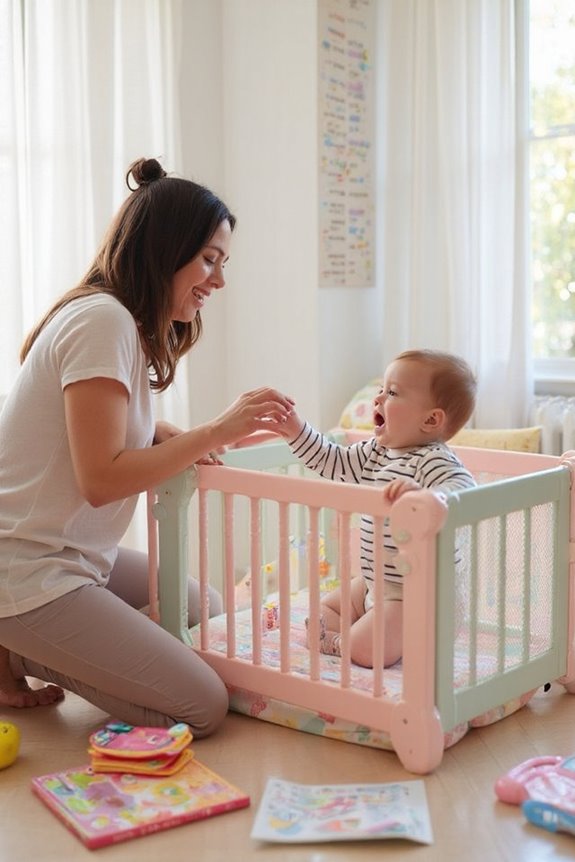
While babies generally follow developmental patterns, several key factors determine exactly when your little one will utter that precious first “mama.” The journey to this milestone isn’t simply about age—it’s influenced by a complex interplay of environmental, physiological, and social elements that shape each child’s unique path to verbal communication.
Key influences include:
Remember that your child’s development timeline is personal—some factors you can influence, while others follow their natural course.
How to Encourage Your Baby to Say “Mama”
Understanding how your baby develops language is only part of the journey—you can actively foster those first precious words.
To encourage “mama,” try these proven strategies:
When your baby attempts sounds like “ma” or “ba,” respond enthusiastically. Create quiet moments where you can focus on speech together, and don’t hesitate to seek professional advice if you notice developmental delays in vocalization patterns.
Cultural Differences in First Word Development
Despite common assumptions that all babies develop language in exactly the same way, research reveals fascinating cultural variations in how babies acquire their first words. While certain words like “mama” and “dada” appear universally, the specific vocabulary babies develop is heavily influenced by their cultural environment.
Parental influence plays a critical role in shaping early language. Research shows that:
Despite these variations, studies confirm that babies worldwide follow similar developmental patterns while incorporating culturally significant terms into their early vocabularies.
When to Consult a Specialist About Speech Delays
How do you know if your child’s speech development is on track? While children develop at different rates, certain speech milestones serve as significant indicators of proper development.
When to seek professional help:
These delays are therapy indicators that shouldn’t be ignored. While 60% of speech delays in children under 3 resolve naturally, early intervention is essential for best outcomes. If your child misses these milestones, consult your pediatrician for a referral to a speech-language pathologist.
Children under 3 can access state-administered early intervention services, while those over 3 may need formal speech therapy evaluation.
Frequently Asked Questions
Can Twins Develop Speech Patterns at Different Rates?
Yes, I’ve observed that twins can develop speech patterns at different rates. Twin communication styles often diverge as each child reaches developmental milestones according to their own unique genetic makeup and environmental interactions.
Do Bilingual Babies Say “Mama” Later Than Monolingual Babies?
Like a seedling adapting to diverse soil, I’ve observed that bilingual babies may say “mama” slightly later due to processing two languages. Bilingual language acquisition depends on early language exposure patterns rather than being definitively delayed.
Does Birth Order Affect When Babies Say Their First Words?
Yes, I’ve found that birth order does influence first words. Firstborn advantages include more one-on-one parent attention, potentially leading to earlier speech. Later-borns benefit from sibling interactions but may speak slightly later initially.
Can Pacifier Use Delay a Baby’s Ability to Say “Mama”?
Yes, I believe pacifier use can delay your baby saying “mama.” Excessive pacifier usage limits vocalization practice and oral muscle development, potentially affecting speech milestones. I’d recommend limiting daytime pacifier use during language development periods.
How Do Hearing Impairments Affect the Timeline for Saying “Mama”?
Delayed detection, delayed speech, delayed “mama.” I’ve found hearing loss greatly impacts speech development, pushing this milestone beyond the typical 6-9 month timeframe. Early intervention with hearing aids can help close this developmental gap.

